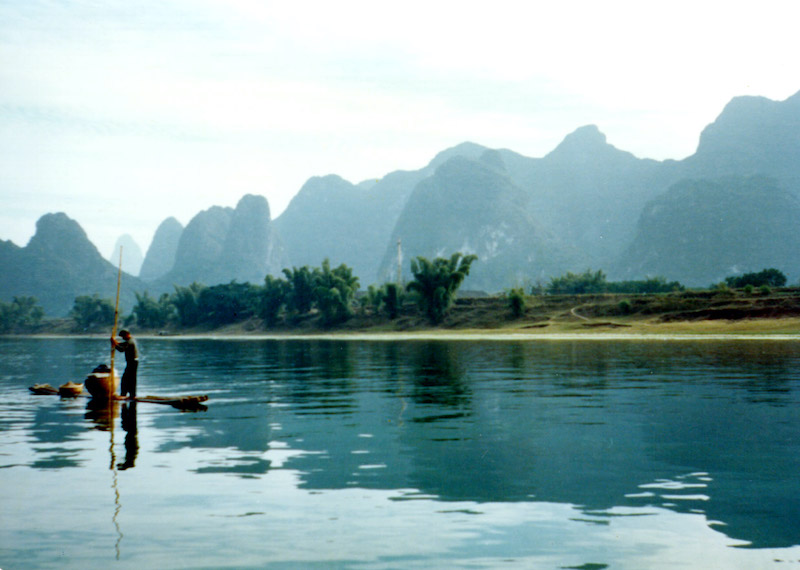Adrienne Su
Author's Statement:
As a child in 1970s Atlanta, I already thought of myself as a writer. The decision had been so easy that it nearly made itself, when I was six and habitually writing stories. Writing and drawing came naturally, and while drawing eventually fell away and poetry took time to emerge as my genre, I never again had to think in large strokes about what I wanted to be.
What one should do to become a creative writer, however, lacks the clarity of knowing that one wants to be one. Although I loved to read, I didn’t enjoy writing analytical essays about novels, stories, and poems, nor was I much good at it, so the formal study of literature did not entice, especially when, in high school, good books were ruined by multiple-choice tests.
I must have intuited that the study of languages would help. My parents, who had immigrated from China as young adults, could speak Chinese but seldom did; our home language was English, and the kids were never forced to attend Chinese school – not that Chinese schools were abundant in Atlanta then – so I was a typically monolingual American. In the absence of pressure, I would have gladly taken Chinese, but school offered only Spanish, French, German, and Latin. My mother recommended Latin because she had found it useful as a foundation for Spanish: take Latin, she said, and all the Romance languages can be yours.
Latin became my strongest subject and my gateway to poetic form. I went to Junior Classical League (JCL) conventions, competed (badly) in the classical trivia contest known as certamen, and found a lifelong friend through a JCL pen-pal program. I exhausted the two years of formal offerings and spent the next three years in the back of Latin II, sometimes with one or two others, trying to translate Virgil’s Aeneid. Our noble teacher wrote comments on all our efforts. Later, I added French to my schedule, but my energies were divided; I could not leave Latin just as I was becoming able to read poetry in it. I headed for college with Classical Studies in mind.
But college offered something I’d never seen before: a department of East Asian Studies. Harvard also had a language-centered option called East Asian Languages and Civilizations. Although dozens of English courses looked enticing, none likely to involve multiple-choice tests, and although I managed to muddle through an upper-level Latin class on Ovid’s Metamorphoses, I could not resist the allure of finally seeing my ancestral history and vocabulary on a syllabus. With Classics and English always in my peripheral vision, with the nagging sense of having failed to use Latin as my mother suggested, I signed up for elementary Chinese, then kept finding another irresistible EAS/EALC course, until I was practically living at Cambridge’s 2 Divinity Avenue, where the Harvard-Yenching Library felt like home.
When you’re eighteen, four years sounds long. At twenty-one, after three years of Chinese instruction, including study abroad in Taiwan and China (where I often heard Japanese spoken among foreign students), I found myself taking intensive Japanese for the thrill of studying it and seeing its connections to Chinese. Other than poetry workshops, I never made it to the English department but was always wistful about it, dreaming of a second, parallel college education, one in which my East Asian hungers had been satisfied earlier and I could leap wholeheartedly from the start into courses such as Helen Vendler’s “Poems, Poets, Poetry” and Stephen Owen’s “Lyric and Self.”
Those days are long in the past. I’ve been a college professor for over twenty years, many of them in an English department. I ought to be accustomed to East Asian Studies as an academic discipline, accustomed to the fact that serious scholars in the West devote their careers to understanding people and civilizations in the East. But some of my eighteen-year-old amazement remains, and part of being a poet is never getting entirely used to the way things are.
Why I’m contemplating this now, I’m not sure, but over decades of writing, I’ve learned that there are questions a poet asks and questions a poet doesn’t ask. Exactly why something is gnawing at you is not important. That you respond to its nudges is.
These five poems, written in late 2022, come from a series of eight, all with the same title. The last, which was also the last one I wrote, “Its shadowing presence,” delivered me back to Latin – to Apollo’s pursuit of Daphne and her transformation into a laurel tree.
Poetry Folio
East Asian Studies ["It began as digression"]
East Asian Studies ["Asymmetries"]
East Asian Studies ["The self disappears"]
East Asian Studies ["Its shadowing presence"]
East Asian Studies ["There was always an attraction"]

Adrienne Su is poet-in-residence at Dickinson College and the author of five books of poems, most recently Peach State (Pitt, 2021), which was named one of 2022’s Books All Georgians Should Read. Her poems have been reprinted in many anthologies, including five volumes of The Best American Poetry. Other poems from her current manuscript-in-progress appear in Belfield Literary Review, The New Yorker, and Woven Tale Press.
